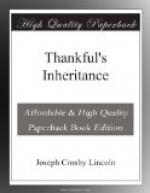“But—but, John, why didn’t you say so sooner? What made you let everyone think—what they did think?”
Before John could reply there came an interruption. The door opened and Thankful Barnes entered. She paid no attention to Captain Obed, but, walking straight to the desk, laid upon it the long envelope which Winnie S. had brought to her house that morning.
“Will you tell me,” she asked, sharply, “what that means?”
John rose. “Yes,” he said, “I will tell you, Mrs. Barnes. It is a rather long story. Sit down, please.”
Thankful sank into the chair he indicated. He took up the envelope.
“I will tell you, Mrs. Barnes,” he said, “why I sent you this deed. Don’t go, Captain Bangs, you know already and I should like to have you stay. Here is the story, Mrs. Barnes.”
He told it briefly, without superfluous words, but so clearly that there could be no possibility of a misunderstanding. When he began Thankful’s attitude was cold and unbelieving. When he finished she was white and trembling.
“Mrs. Barnes,” he said, in conclusion, “I’m a peculiar fellow, I’m afraid. I have rather—well, suppose we call them impractical ideas concerning the ethics of my profession, duty to a client, and that sort of thing. I have always been particular in taking a case, but when I have taken it I have tried to carry it through. I—as you know, I hesitated before accepting my cousin’s retaining fee and the implied obligation. However, I did accept.”
He might have given his reasons for accepting but he did not. He went on.
“When this matter of your property came up,” he said, “I at first had no idea that the thing was serious. You owned the property, as I supposed, and that was sufficient. I had told my cousin that and meant to tell you. I meant to tell you a portion of what I have just told the captain here, but I—well, I didn’t. Mr. Daniels’ remarks irritated me and I—well, he put the case as a test of legal skill between himself and me, and—and I have my share of pride, I suppose. So I determined to beat him if I could. It was wrong, as I see it now, and I beg your pardon.”
Thankful put a hand to her forehead.
“But you did—beat him, didn’t you?” she stammered. “You found I didn’t own the land.”
“Yes. I found I owned it myself, legally. If I had found it belonged to anyone else, I—well, I scarcely know what I should have done. You see,” with a half smile, “I’m trying to be perfectly frank. Finding that I was the owner made it easy.”
She did not understand. “It made it easy,” she repeated slowly. “But you gave it to me!”
He leaned forward. “Please don’t misunderstand me,” he said earnestly. “As I see it, that land belonged to you by all that is right and fair. Legally, perhaps, it didn’t, but legal honesty isn’t always moral honesty. I’ve found that out even in my limited practice.”




